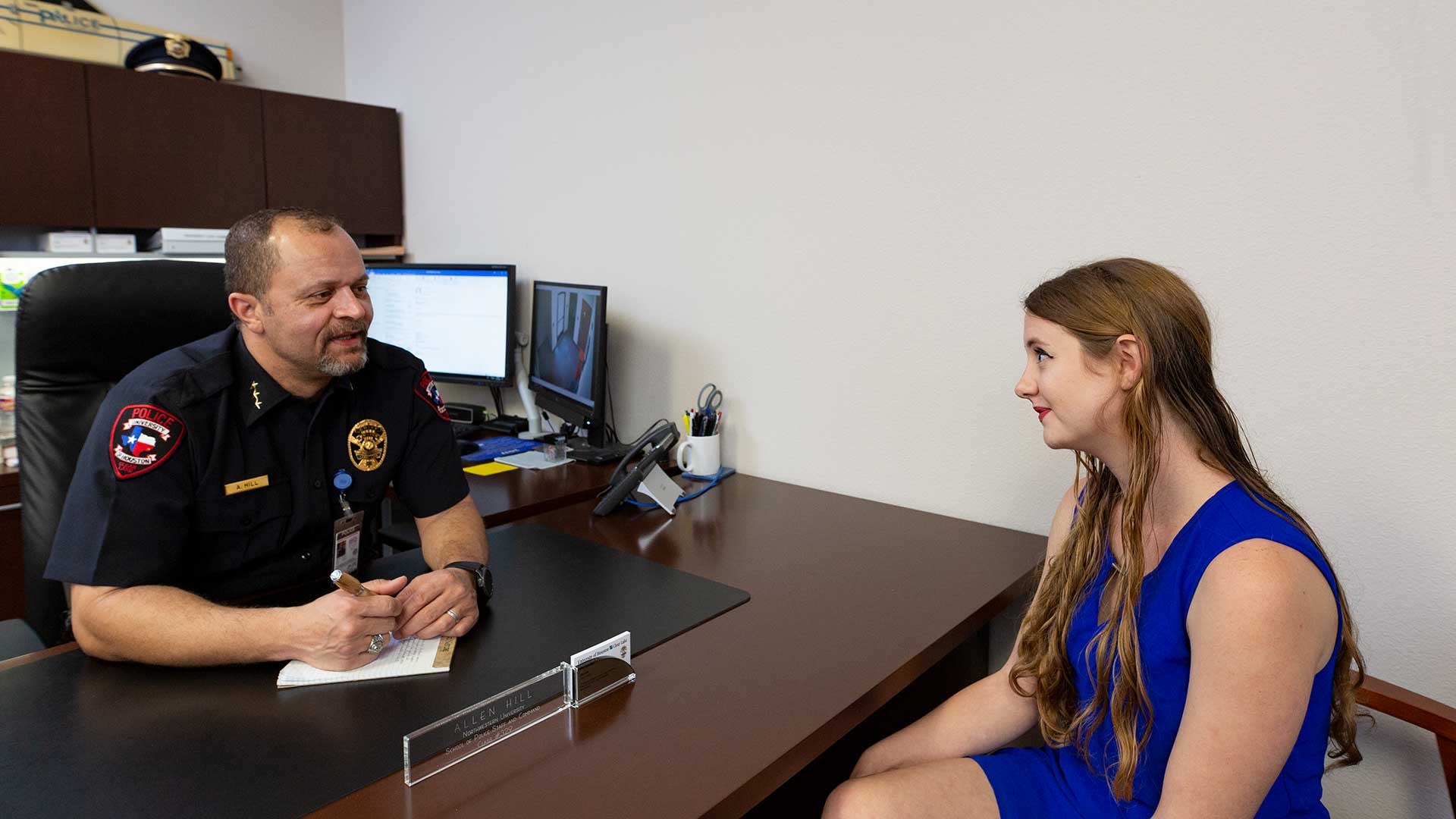UHCL student developing protocol for police response to people with autism
April 18, 2019 | UHCL Staff

Encounters between law enforcement and people on the autism spectrum can easily end
badly for a number of reasons. Karlie Hinkle, who is working toward her Master of Arts in Behavior Analysis at University of Houston-Clear Lake, hopes to help educate campus police as well
as the Houston Police Department by creating a training protocol that coaches officers
on how to adapt their approach for people with autism.
People with autism face a common predicament: Some of their traits, which could include
social anxiety, poor language skills or trouble making eye contact, can add up to
a police officer’s standard profile of a suspicious person. For a person with autism,
flashing lights, sirens and the approach of a uniformed stranger demanding responses
could be intensely frightening.
“I’d like to help educate the police about this,” Hinkle said. “I saw a need for training.
Police are not extensively trained recognize the characteristics of a person with
autism, nor what to do in that situation. I have come up with a procedure that includes
steps to make it a better interaction.”
Hinkle, who said the protocol was part of the research project required for her program,
said that she has a personal history with people with autism. “My family adopted a
baby who was later diagnosed with autism, and he’s now 9 years old,” she said. “He
received behavior analytic services and those results were amazing for him. That’s
why I have chosen to study behavior analysis.”
Hinkle received her Bachelor of Science in Psychology from UHCL in 2017 and is scheduled to receive her master's degree in 2020. Her graduate
program requires a research project, which she plans to turn into her thesis project.
“The work I’m doing here is part of my research project,” she said. She has been working
with HPD since 2018, currently instructing a crisis intervention class in a section
specifically focused on autism.
She explained that a police officer might encounter a person engaging in repetitive
behavior, such as hand flapping or repeating the last thing they heard.
“It might look like drug addiction, or someone who’s just very strange and maybe up
to no good,” she said. “It’s possible they’re completely nonverbal. Among other things,
the training helps officers determine if the person is being non-compliant or if they
just can’t talk.”
Through roleplay and simulations, officers will be trained to question people in a
way that they can assess the person’s level of functioning. “This will increase the
likelihood that a person will comply appropriately to a certain instruction,” she
said. “For example, if the person does not respond verbally to questions, ask them
to do something else, like stand up,” she said. “Because it’s important for police
to see hands, an instruction could be, ‘Hold up your hands.’”
She said police officers will be trained above all, to try to establish rapport. “We
teach officers to keep saying, ‘I’m here to help you.”
UHCL Chief of Police Allen Hill has required all his sworn police officers to take the training. “While our officers
already do an exceptional job of interacting with people, I also believe it is my
responsibility to make sure that they are receiving the best training available,”
Hill said. “When Dr. Lerman reached out to me about Karlie’s training, I didn’t think
twice about supporting it in any way we could. We have an exceptional Center for Autism and Developmental Disabilities, and I feel I would be failing the CADD Program, Karlie, UHCL, and our officers if
I did not support this training.”
Dorothea Lerman, professor of psychology and director of CADD, has been overseeing Hinkle’s research project. “Karlie is developing this training
and will evaluate the outcomes with police in Houston, but she’s piloting the procedures
first and our campus police were very eager to receive the training,” she said. “Our
campus police have been called to report people who are acting suspiciously, but sometimes
it’s just people with autism. Police on our campus have been very sensitive to that,
so when they get those calls, they handle it well, but outside our campus, that might
not be the case.”
Lerman said that 1 in 59 people has autism, so there will certainly be encounters.
“It makes a lot of sense to train officers on the likely behaviors of people with
autism and how to respond so they don’t escalate a situation.” She added that there
are many training programs for police officers, but very few go beyond just giving
guidelines.
“Karlie’s program is very hands-on. We will assess the effects of the training in
a role-play simulation, not a written test,” she said.
Hill added, “We are very fortunate and thankful that Dr. Lerman and Karlie collaborated
with us. I will be working with Karlie to find ways to provide this training to all
future UHCL PD officers as well.”
Hinkle said that although HPD collects data about its interactions with Houston’s
mentally ill population, it does not indicate how many of those were with people with
autism. “I hope that with this training, police walk away with a better understanding
of what autism is, and feel more empowered interacting with these individuals.”
For more information about UHCL’s Behavior Analysis program, visit www.uhcl.edu/human-sciences-humanities/departments/clinical-health-applied-sciences/behavior-analysis/.
About the Author:
Recent entries by
October 18 2022
Better technology transforms campus safety: Police Chief demonstrates SafeZone to students
October 14 2022
Student's skill with drones takes chicken turtle research to new heights
October 11 2022
Planting event to help UHCL restore native plants to campus, support environmental sustainability







